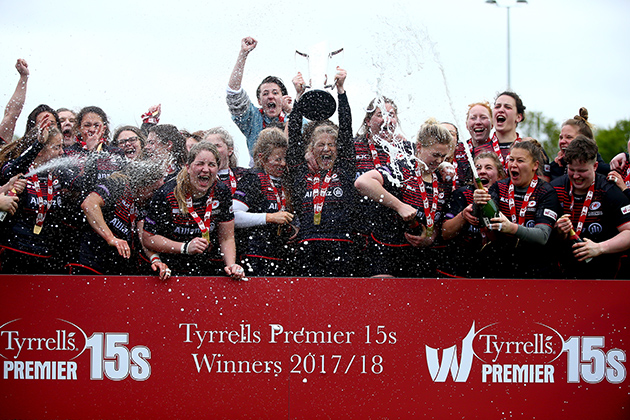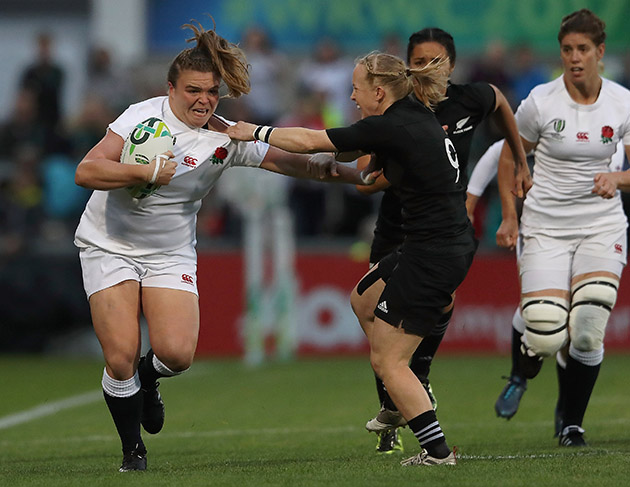New Zealand have given their top women’s 15-a-side players contracts for the first time – Ali Donnelly gets the lowdown
Black Ferns awarded first-ever contracts
A few weeks on from the news that New Zealand’s 15-a-side women’s stars are receiving professional contracts for the first time, Kendra Cocksedge is reflecting on how well it has gone down with the public.
“The reaction has been hugely positive and I think the players, fans and the country are excited about where the women’s game is going,” the scrum-half says. “People have been talking to me about what a positive step it is, so there has been really good awareness of what’s happening and it’s all positive.”
Cocksedge played an integral role in the negotiations and although she is keen not to overplay the announcement, she believes it’s a vital stepping stone on the road to being fully professional.
“This is a big step forward. There is no going back now as far as I’m concerned. The investment and the profile is only going to get bigger from here on in.”
Despite winning five of the past six Women’s World Cups, New Zealand have always lagged behind in terms of investing in the Black Ferns. Sevens has taken precedence in recent seasons, but last year’s World Cup win in Ireland put the 15s team back in the public eye.

Star turn: Kendra Cocksedge is a standout at scrum-half (Getty Images)
“It’s really taken off since our success last year,” says Cocksedge. “That win has helped changed mindsets. More people watched that World Cup than ever before and the public have been impressed with the quality of the game.”
The key detail of the contracts is that up to 30 Black Ferns will be placed on guaranteed retainers, paid between $12,500 and $20,000 (£6,500-10,500) annually, based on Test experience. While this is a hugely welcome move, Cocksedge says in reality it won’t be life-altering for most of the top players.
“The way it’s being modelled means for a lot of us it’s about being rewarded for what we were doing anyway. The commitment is something like training ten to 14 hours per week in our hubs and individually.
“I was certainly doing that, but for some players the contracts mean extra support in areas they might not have had, like medical, insurance and so on.”
As part of the negotiating team, Cocksedge is well-placed to talk about the changing world of professionalism in the women’s game, where contracts are becoming the norm and athletes are playing catch-up in how to deal with it.

Reward: Players will now be paid to attend training camps (Getty Images)
“I was part of a wider team involved – there were six or seven of us – and I learnt a lot around the whole process. Generally I think there are not many women’s players well equipped yet in understanding what they need to do before signing deals. That is something that we’re going to have to work on.
“The more the game goes down this route, the more players are signing on with agents and so on, the better that will be. It is a new world.”
Does she believe more youngsters will now choose rugby in New Zealand?
“Yes. Lots of girls here are playing five or six sports at high school and making decisions later. Now getting a full-time sevens contract is an option, as is getting a 15s part-time contract, so rugby union is going to become a really competitive option for that talent and there are also players playing other codes who are looking to come across.”
As well as winning the World Cup, Cocksedge says the development of other nations was a catalyst for change in NZ Rugby, who have been criticised for their commitment to the Black Ferns.
“While it mostly came off the back of the success last year, it was alongside the fact other countries had moved ahead. We needed to do something to keep our players here and this will help to do that. People will continue to go overseas for a different life experience, but this is a really good incentive and means we’re not going to fall behind.”
MORE ON WOMEN’S RUGBY:
Tyrrells Premier 15s inspiring next generation
After Saracens’ success in the inaugural Tyrrells Premier…
Opinion: What’s next for women’s rugby?
Why rugby must build on the momentum created…
Women’s World Cup Final: England 32-41 New Zealand
All you need to know about the Women’s…
The move of the women’s game to a more professional model has led to developments in top domestic leagues, including in England, France and Australia where significant investments are being made. Cocksedge believes New Zealand also have a chance to make improvements in this area.
“The NPC is a quality competition and it has become much more competitive. It’s interesting to see how others are investing in their leagues and perhaps the future is a league for us alongside the top Australian team. I believe that is realistic and possible and would be a huge boost to the game here.
“The game is just continuing to move forward at every level. I watched a lot of the Six Nations this year and thought France were fantastic; they’re going to be a huge threat in the years to come.
“Countries like Japan are investing in their systems and leagues, and players are going there from overseas, so the money is going in and it’s getting more exposure. I’m glad we’re part of it.”
The first 28 Black Ferns players to be contracted by the NZ Rugby have been named and include 17 of the 2017 World Cup-winning squad.
2018 BLACK FERNS SQUAD
FORWARDS: Eloise Blackwell, Les Elder, Fiao’o Faamausili, Dhys Faleafaga, Harono Iringa, Aldora Itunu, Linda Itunu, Pip Love, Charmaine McMenamin, Toka Natua, Joanah Ngan Woo, Te Kura Ngata-Aerengamate, Aleisha Nelson, Marcelle Parkes, Leilani Perese, Aroha Savage, Charmaine Smith.
BACKS: Chelsea Alley, Ariana Bayler, Grace Brooker, Kendra Cocksedge, Krysten Cottrell, Ruahei Demant, Kilistina Moata’ane, Victoria Subritzky-Nafatali, Kristina Sue, Renee Wickliffe, Selica Winiata.
This article originally appeared in the June 2018 issue of Rugby World magazine. Follow Rugby World on Facebook, Twitter and Instagtam.








